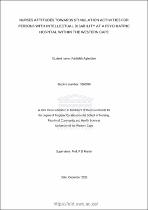Nurses attitudes towards stimulation activities for persons with intellectual disability at a psychiatric hospital within the Western Cape
| dc.contributor.advisor | Martin, Penelope | |
| dc.contributor.author | Agherdien, Faldielah | |
| dc.date.accessioned | 2023-05-08T07:31:25Z | |
| dc.date.available | 2023-05-08T07:31:25Z | |
| dc.date.issued | 2022 | |
| dc.identifier.uri | http://hdl.handle.net/11394/9845 | |
| dc.description | Magister Curationis - MCur | en_US |
| dc.description.abstract | Globally, stimulation activities yield positive outcomes for persons with intellectual disability (ID), in terms of behavioural and cognitive changes. Intellectual disability is characterised by significant changes in intellectual and adaptive behaviours, identified before the age of 18. The treatment of institutionalised ID persons involves: the medical management of symptoms and aggressive behaviour (as behavioural therapies); physiotherapy, within a multidisciplinary team approach; and activity programmes, including stimulation activities, which are managed by nurses. However, given the shortage of nurses, and the complex needs of people with ID, as well as the negative attitudes, stimulation activities may not be considered a priority in the provision of nursing care. | en_US |
| dc.language.iso | en | en_US |
| dc.publisher | University of the Western Cape | en_US |
| dc.subject | Psychiatric | en_US |
| dc.subject | Mental health | en_US |
| dc.subject | Nursing | en_US |
| dc.subject | Disability | en_US |
| dc.subject | Western Cape | en_US |
| dc.title | Nurses attitudes towards stimulation activities for persons with intellectual disability at a psychiatric hospital within the Western Cape | en_US |
| dc.rights.holder | University of the Western Cape | en_US |

